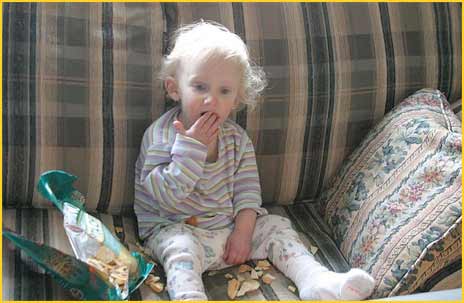
Claire Bates is one of the many health writers who has noticed the tendency of childhood obesity studies to indict parents. If children are to make lifestyle changes, their chances are much better if it’s a family affair. Bates says:
Researchers found that obese youngsters were far more successful at shedding the excess pounds if their parents got in shape with them… [I]t was only when the parents slimmed down that the children consistently did likewise.
Deborah Dunham cites a study by the National Center for Health Statistics, which shows that ridiculously massive sugar consumption is not mainly the fault of fast food establishments or the advertising industry, or even the schools. Most of the sugar eaten by children is found in their homes. The people in charge of the homes are the parents, and the obvious conclusion is that parents are not trying hard enough.
Dunham says that three very simple lifestyle changes can make a huge difference. The first is to buy low-sugar cereals and add no extra sugar when they are consumed. Another is, of course, to buy fresh food instead of the processed kind.
The third is simple, but maybe not easy — put the kids on water rather than sports drinks. Dunham says:
Kids simply don’t need sports drinks on a regular basis. These are designed for endurance athletes who need to replenish lost electrolytes and carbs during the heat and long workouts (over one hour). They are not appropriate for kids as a snack, with a meal or even at a routine soccer practice.
Dr. Pretlow says:
As kids presumably become addicted to highly pleasurable foods in the process of comfort eating, this implies that, in order to break their addiction, obese kids must go through withdrawal and then develop other ways to comfort themselves and deal with stress, sadness, and boredom without turning to food. Stress management is essential.
Much more information can be found in Dr. Pretlow’s “Addiction to Highly Pleasurable Food as a Cause of the Childhood Obesity Epidemic: A Qualitative Internet Study.” Parents have to find the necessary strength, wisdom, and skill to be with their children through non-fun things like withdrawal from addictive substances. It’s not easy. Everybody’s stress needs to be managed.
In “How to Actually Help a Drug Addict,” Tony Bylsma, a rehabilitation counselor on the West Coast, explains the progress of a substance dependency:
If the drug seems to solve a problem the person has, he is likely to then use the substance again. If the ‘remedy’ works a second time, it can become a solution that will be leaned on in the future, over and over again. The problem being suppressed by the drugs will be growing stronger with time and because the person is no longer actually seeking to solve it, but is now satisfied with the cover-up, what was once a normal problem can grow to tremendous size.
Bylsma offers important guidance that is useful to the loved ones of any person in the grip of substance abuse. First, he emphasizes that the addiction, including food addiction, isn’t the problem, but a symptom of the problem. This is the flaw in therapeutic establishments that only attend to physical withdrawal, but do not equip the patient to carry on with life after detox. He warns:
If that patient does not then somehow learn to deal the original causes of his or her addiction, chances of any permanent changes in behavior are very low. Such detox centers might be necessary for the first few days of withdrawal… But this must then be followed by actual rehabilitation, including an effective address of the underlying causes of substance abuse. Otherwise, we’re just heading right back into the same situation, again and again.
And when a child or a teen has successfully completed a detox program and become detached from a crippling dependency on food, parents are the ones who need to maintain, every day thereafter, the kind of environment that does not encourage addiction to any harmful substance. It’s a lot of hard work.
Your responses and feedback are welcome!
Source: “How to help your child lose weight? Shed the pounds yourself,” DailyMail.co, 03/15/12
Source: “Childhood Obesity Is Not Going To End Until Parents Stop Feeding Kids Sugary Crap,” BlissTree, 02/29/12
Source: “How to Actually Help a Drug Addict,” Ezine Aricles
Image by Elizabeth/Table4Five, used under its Creative Commons license.

 FAQs and Media Requests:
FAQs and Media Requests: 











